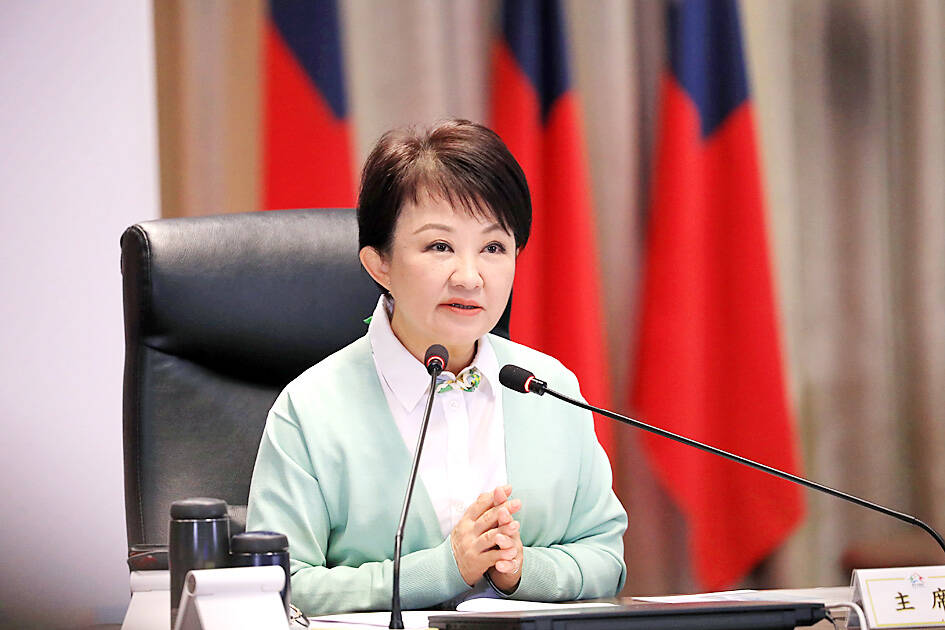Taiwan Semiconductor Manufacturing Co (TSMC, 台積電) is expected to inaugurate a new 1.4-nanometer fab in Taichung, the most advanced operated by the world’s biggest contract chipmaker, in 2027, after the government approved zoning changes for the project, the Taichung City Government said yesterday.
The new fab is expected to generate NT$1.2 trillion (US$38 billion) in production value, together with companies that would also operate in the newly planned industrial area, the city government said, citing a Central Taiwan Science Park (中部科學園區) estimate.
“TSMC hopes to add capacity for its second-phase expansions in Taichung to cope with customer demand. The chipmaker operates three fabs in the city now,” Taichung Mayor Lu Shiow-yen (盧秀燕) said yesterday.

Photo: Su Meng-chuan, Taipei Times
TSMC plans to build four 12-inch fabs, utilizing more advanced technology than its 2-nanometer technology, the city government said.
The project is expected to create 4,200 jobs.
Lu’s remarks came after the Ministry of the Interior approved the zoning changes proposed by the Taichung City Government for the land that has been allocated for the new TSMC fab.
As a major portion of the land is privately held by a single owner, who operates a golf course there, the land appropriation should be easier, the city government said.
The Central Taiwan Science Park administration would be in charge of land appropriation.
TSMC’s 2-nanometer chips are scheduled to be available next year. The chipmaker’s 3-nanometer chips are already being used in Apple Inc’s latest iPhone 15 series.
TSMC is expanding its global footprint to satisfy customer demand and boost supply chain resilience, while further developing advanced wafer manufacturing and packaging technologies in Taiwan.
The company plans to budget between US$28 billion and US$32 billion for capital expenditures this year, with about 70 to 80 percent of it earmarked for advanced technology capacity expansion, it said.

Nvidia Corp’s demand for advanced packaging from Taiwan Semiconductor Manufacturing Co (TSMC, 台積電) remains strong though the kind of technology it needs is changing, Nvidia CEO Jensen Huang (黃仁勳) said yesterday, after he was asked whether the company was cutting orders. Nvidia’s most advanced artificial intelligence (AI) chip, Blackwell, consists of multiple chips glued together using a complex chip-on-wafer-on-substrate (CoWoS) advanced packaging technology offered by TSMC, Nvidia’s main contract chipmaker. “As we move into Blackwell, we will use largely CoWoS-L. Of course, we’re still manufacturing Hopper, and Hopper will use CowoS-S. We will also transition the CoWoS-S capacity to CoWos-L,” Huang said

Nvidia Corp CEO Jensen Huang (黃仁勳) is expected to miss the inauguration of US president-elect Donald Trump on Monday, bucking a trend among high-profile US technology leaders. Huang is visiting East Asia this week, as he typically does around the time of the Lunar New Year, a person familiar with the situation said. He has never previously attended a US presidential inauguration, said the person, who asked not to be identified, because the plans have not been announced. That makes Nvidia an exception among the most valuable technology companies, most of which are sending cofounders or CEOs to the event. That includes

TARIFF TRADE-OFF: Machinery exports to China dropped after Beijing ended its tariff reductions in June, while potential new tariffs fueled ‘front-loaded’ orders to the US The nation’s machinery exports to the US amounted to US$7.19 billion last year, surpassing the US$6.86 billion to China to become the largest export destination for the local machinery industry, the Taiwan Association of Machinery Industry (TAMI, 台灣機械公會) said in a report on Jan. 10. It came as some manufacturers brought forward or “front-loaded” US-bound shipments as required by customers ahead of potential tariffs imposed by the new US administration, the association said. During his campaign, US president-elect Donald Trump threatened tariffs of as high as 60 percent on Chinese goods and 10 percent to 20 percent on imports from other countries.

INDUSTRY LEADER: TSMC aims to continue outperforming the industry’s growth and makes 2025 another strong growth year, chairman and CEO C.C. Wei says Taiwan Semiconductor Manufacturing Co (TSMC, 台積電), a major chip supplier to Nvidia Corp and Apple Inc, yesterday said it aims to grow revenue by about 25 percent this year, driven by robust demand for artificial intelligence (AI) chips. That means TSMC would continue to outpace the foundry industry’s 10 percent annual growth this year based on the chipmaker’s estimate. The chipmaker expects revenue from AI-related chips to double this year, extending a three-fold increase last year. The growth would quicken over the next five years at a compound annual growth rate of 45 percent, fueled by strong demand for the high-performance computing